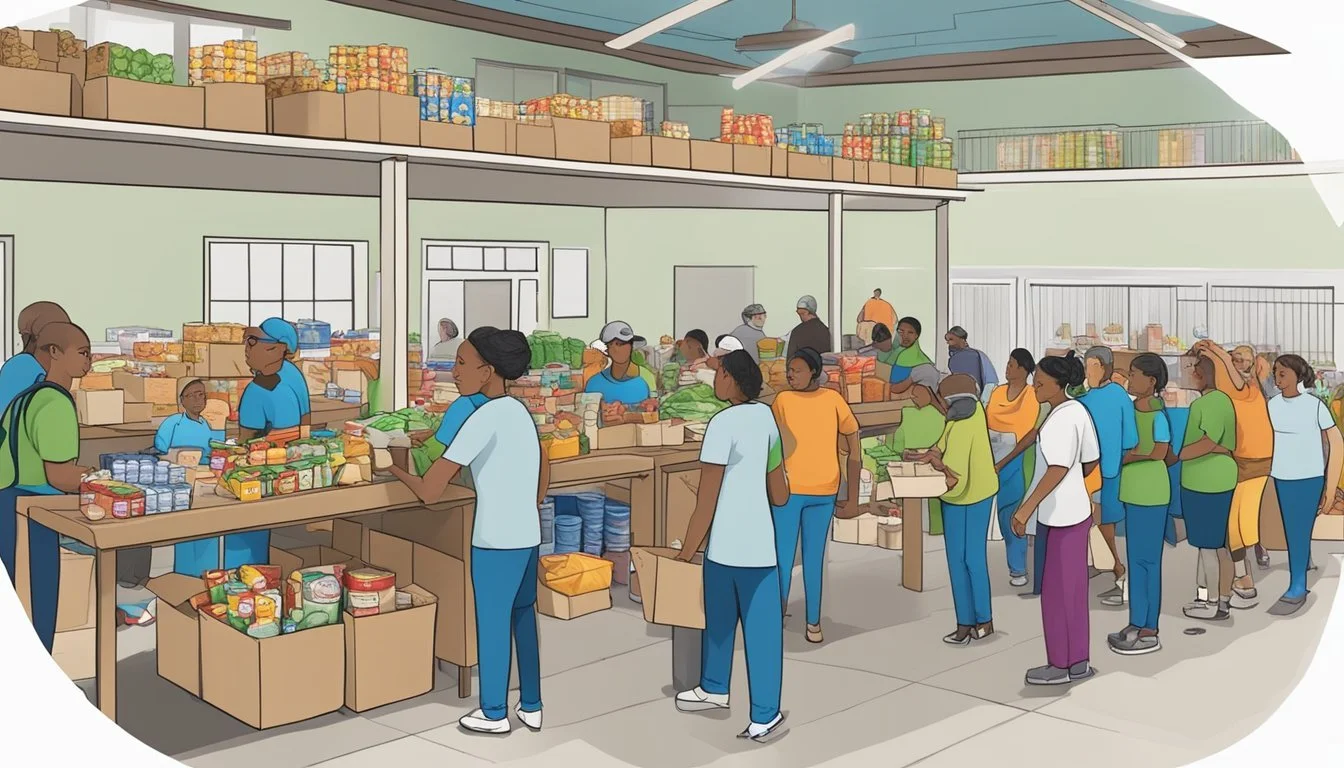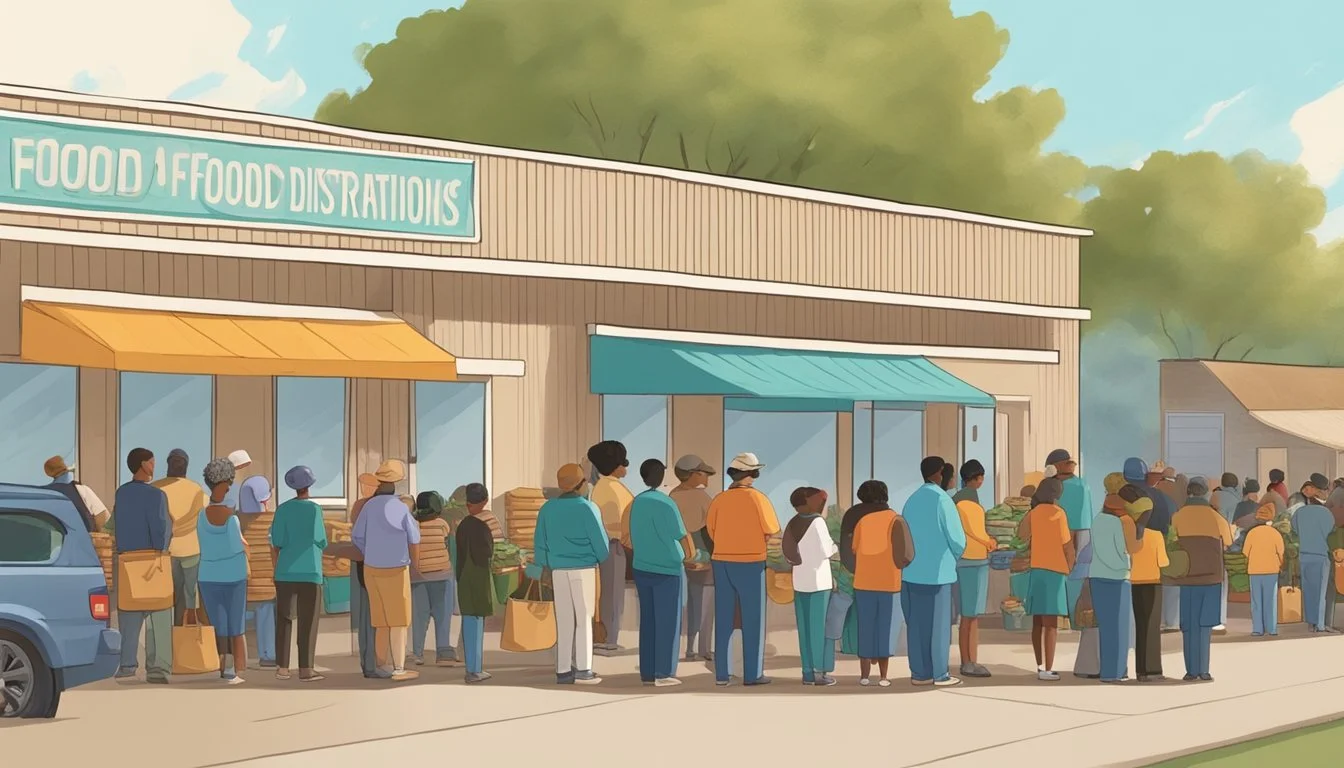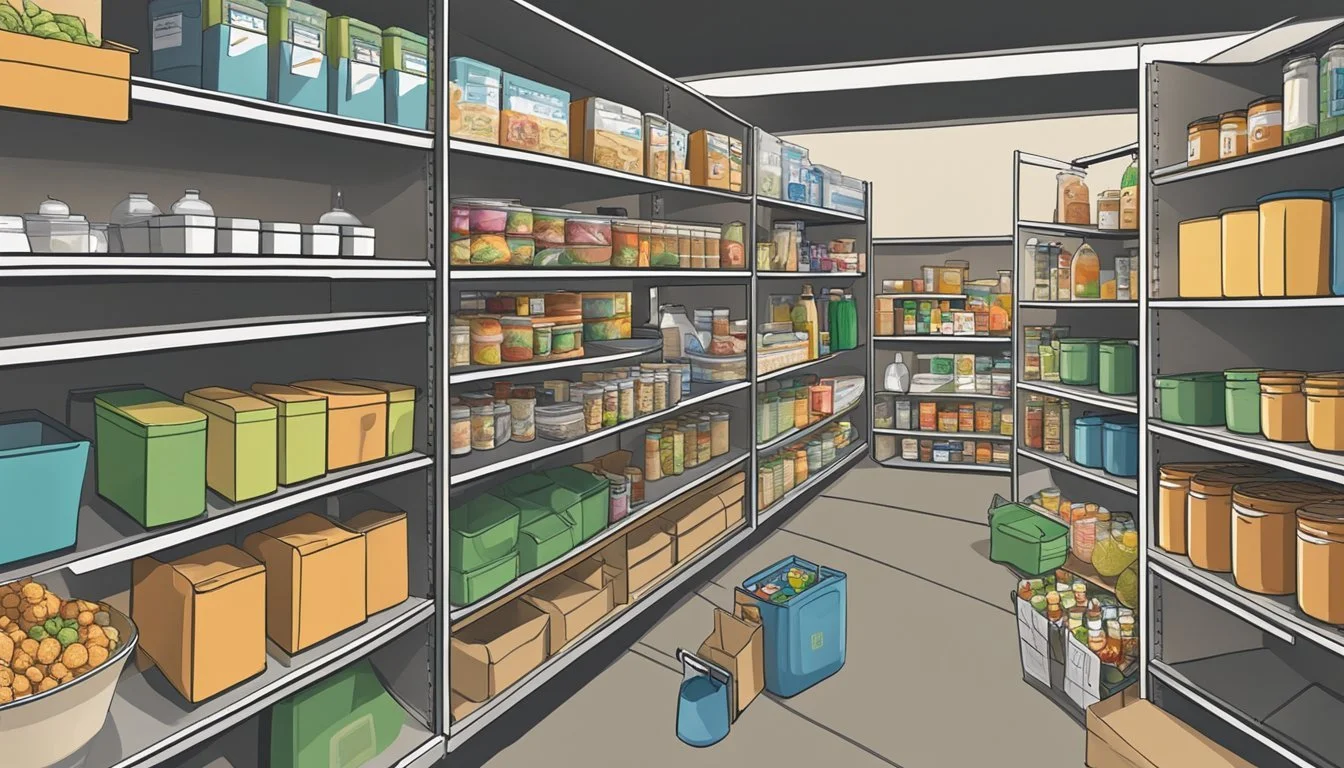Free Groceries and Food Pantries in Ward County, Texas
Your Essential Guide
This Article is Part of Our Guide on Free Groceries in Texas
Access to nutritious food is a fundamental necessity, and for many residents of Ward County, Texas, food pantries provide an essential service. Food insecurity can affect anyone, from individuals and families to seniors and children, and Ward County has established a network of food pantries to address this critical need. These pantries are more than just a place to receive free groceries; they serve as community supports that offer a lifeline of assistance to those facing temporary or long-standing hardship.
Food pantries across Ward County operate with the goal of ensuring no individual goes without the basic need of food. These services often extend beyond simply providing canned goods or dry staples, as many pantries also offer fresh produce, dairy products, and sometimes even personal care items. Tailored to meet the needs of their local communities, these pantries may also provide educational resources on nutrition and budgeting to help clients maximize the benefits of the food they receive.
The process to take advantage of these services is typically straightforward, with many food pantries allowing residents to visit without the need for a referral. However, it is recommended for individuals seeking assistance to check the operating hours and any potential eligibility requirements beforehand to ensure the most efficient use of the support available. By working to eliminate hunger, these food assistance programs play a vital role in fostering the health and well-being of communities throughout Ward County.
Understanding Food Insecurity
In Ward County, Texas, food insecurity is a tangible concern affecting many residents, where the role of food banks and pantries is crucial in mitigating hunger among low-income families.
Importance of Food Banks and Pantries
Food banks and pantries provide critical support to communities facing food insecurity. These entities are essential for supplying free groceries and offering food assistance to those who struggle to afford sufficient and nutritious meals. They act as a network, collecting and distributing food to individuals and families, often in partnership with local organizations. In addition, they play a significant role in bridging the gap during times of sudden unemployment or financial hardship.
Statistical Overview in Ward County
Food Bank Impact:
Number of Food Banks/Pantries: X in Ward County
Meals Provided Annually: Y meals
Community Reach:
Families Served Monthly: Approximately Z families
Food assistance programs in Ward County aim to address the needs of the community by providing support through various food banks and pantries. These services are vital for low-income individuals and families who may not have enough resources to maintain a consistent and healthy diet. The effectiveness of these programs can often be reflected in local statistics, which help in understanding the scale and impact of food assistance in the area.
The availability of free groceries through these food assistance programs ensures that the residents of Ward County have a better chance at achieving food security, ultimately contributing to the overall health and stability of the community.
Finding Food Assistance
In Ward County, Texas, residents seeking food assistance have various resources at their disposal, including food pantries, food banks, and government programs designed to alleviate hunger.
Eligibility for Food Programs
Individuals in Ward County can determine their eligibility for food assistance programs through several criteria. Government assistance options like SNAP food stamps and Women, Infants, and Children (WIC) are based on household income and size. Criteria may vary, so applicants should consult the respective program guidelines.
SNAP: Provides nutrition benefits to supplement the food budget of needy families.
WIC: Offers federal grants to states for supplemental foods for low-income pregnant, breastfeeding, and non-breastfeeding postpartum women, and to infants and children up to age five.
How to Locate Pantries and Food Banks
To locate a food pantry or food bank in Ward County:
Zip code search: Use your zip code to search online databases or local websites for nearby facilities.
Feeding America network: Residents can access a list of partner food banks by entering their state or zip code on the Feeding America website.
Local resources: Check with community centers or religious organizations for information on food distributions.
Resource Type How to Access Food Pantries Visiting local pantries during their hours of operation. Feeding America Banks Entering zip code on the website to find the nearest location. Government Programs Applying for SNAP or WIC through state agencies or online portals.
Residents are encouraged to reach out directly to identified pantries for the most current information on hours and services as details may change.
List of Food Banks and Pantries in Ward County
Residents in Ward County have access to a variety of food pantries that help individuals and families struggling with food insecurity. These pantries provide essential groceries and support, ensuring residents can obtain the food assistance they require.
Comprehensive Directory
Salvation Army Food Shelf Minot
Location: Minot, ND - 58701
Phone: (701) 838-8925
Hours: Monday, Wednesday, and Friday: 10:00am - 12:00pm; 1:00pm - 3:00pm
This pantry is a staple in the community, offering a broad selection of groceries to help locals stretch their food budgets with nutritious options.
Contact Details and Operation Hours
For more information and a detailed schedule of operations, the community is advised to reach out via the phone number provided. Food assistance queries can be addressed promptly, ensuring that the process for obtaining aid is as smooth and accessible as possible.
Phone: (701) 838-8925
Hours of Operation: Monday, Wednesday, and Friday: 10:00am - 12:00pm; 1:00pm - 3:00pm
Individuals seeking assistance are encouraged to contact the pantry ahead of their visit to confirm the availability of food items and any changes to the operating hours.
Specialized Assistance Programs
Ward County offers a variety of specialized assistance programs designed to provide nutritional support to vulnerable populations, including families, the elderly, and individuals with disabilities. These resources aim to ensure that every person has access to essential food supplies and support services they require.
Programs for Families and Individuals
Families with Children: There are local food pantries and assistance programs that can provide regular access to free groceries, including items like baby formula and child-friendly foods.
Elderly Care: Programs such as Meals on Wheels are available to deliver nutritious meals directly to the homes of senior citizens who may have mobility challenges or cannot prepare food for themselves.
Individuals with Disabilities: This group can benefit from tailored services, such as home-delivered meals and assistance in signing up for government benefits like the Supplemental Nutrition Assistance Program (SNAP).
Certain food pantries in Ward County may also offer drive-thru services to provide a convenient way for individuals and families to receive food without the need to leave their vehicle, helping those with limited transportation or mobility.
Additional Services Offered
Ward County not only offers food assistance but also connects residents to:
Government Benefits: A dedicated service to aid residents in navigating and applying for food-related government benefits.
Utilities Support: Some programs assist with home necessities like heat, electricity, utility, and internet bills.
These additional services are integral in providing a comprehensive support system that goes beyond the immediate provision of food. They help individuals and families make ends meet, leading to improved quality of life and greater stability within the community.
Maximizing Food Benefits
Ward County residents seeking food assistance can maximize their benefits through strategic access and collaboration with local organizations aimed at alleviating hunger.
How to Access and Use Benefits
Individuals in need can access food benefits by connecting with Feeding America or local food banks that offer various programs. These benefits include SNAP, which requires an application process that local food banks often assist with. Ward County runs food pantries that are open several times a week, such as on Mondays, Wednesdays, and Fridays from 11:00am to 2:00pm, for individuals seeking immediate assistance. Distribution is enhanced through the use of drive-thru pantries, facilitating a convenient way to receive a nutritious mix of food without leaving the car. Moreover, Mobile Pantries operate on a regular schedule, bringing pre-packed grocery boxes to communities, ensuring that food reaches a wider audience.
Drive-Thru Pantries: Convenient food pickup.
Mobile Food Banks: Regular visits to communities with pre-packed food items.
Collaborations with Local Organizations
Partnerships between food banks and various local entities, such as churches, charities, and volunteers, are essential. These collaborations often extend the reach of food distributions, ensuring that residents in more remote or underserved areas have access to food. Organizations like the Salvation Army often participate in these efforts, providing additional support and resources. Local community groups are instrumental in organizing food drives and fundraisers, directly impacting the availability of resources for food pantries.
Charities and Churches: Partner with food banks to extend food distribution.
Volunteers: Crucial for operation of pantries and distribution events.
Salvation Army: Provides support and resources for food assistance.
Events and Food Distributions
In Ward County, Texas, residents have access to various food distribution events designed to ensure that no one in the community goes hungry. These events are organized by non-profit organizations and staffed by dedicated volunteers, providing free groceries to those in need via scheduled community gatherings and convenient drive-thru pantry services.
Scheduled Community Events
Ward County's local food banks and non-profits host multiple food distribution events throughout the year. Community members in need can find support through these events, where a variety of food items are distributed. Volunteers play a crucial role in organizing and running these events, ensuring a smooth and efficient experience for everyone involved.
Next Scheduled Event:
Date: March 15, 2024
Location: Ward County Community Hall
Time: 10:00 AM - 2:00 PM
Following Event:
Date: April 22, 2024
Location: Old Stadium Parking Lot
Time: 9:00 AM - 1:00 PM
Drive-Thru Pantry Services
Drive-thru pantries offer a fast and private way for individuals and families to receive food without leaving their vehicles, enhancing convenience and efficiency. These services are essential for those who may face mobility challenges or time constraints, and are a testament to the adaptability of food assistance programs in Ward County.
Operational Hours: Every First and Third Thursday, 12:00 PM - 3:00 PM
Location: Central Food Bank of Ward County
Available Supplies: A nutritious mix of perishable and non-perishable items
For more information on event dates and drive-thru pantry locations, residents are encouraged to connect with local food banks and community help centers.
How to Volunteer or Donate
Ward County, Texas, benefits greatly from the dedication and generosity of its residents. Opportunities to support the community through food banks are plentiful for those looking to volunteer time or make donations.
Volunteering Opportunities
Charities and non-profit organizations in Ward County always welcome new volunteers. The Houston Food Bank, Tarrant Area Food Bank, and North Texas Food Bank are prominent entities that rely on volunteers for various tasks. These can range from sorting and packing food items to assisting in food distribution. Interested individuals can usually sign up for volunteer shifts directly through the organization's website or by calling their local offices.
Houston Food Bank: Organize or participate in food drives, help in the warehouse.
Tarrant Area Food Bank: Offer administrative support, or engage in community outreach.
North Texas Food Bank: Provide assistance in meal preparation and educational programs.
Donation Channels
Donations are the lifeline of food banks and pantries. Monetary contributions provide the most flexibility and allow food banks like Houston Food Bank, Tarrant Area Food Bank, and North Texas Food Bank to purchase food at discounted rates. Individuals can donate money online through secure payment portals or send checks to their preferred organization's physical address.
For food and in-kind donations:
Houston Food Bank: Canned goods, dry goods, and personal care items.
Tarrant Area Food Bank: Fresh produce, meat, and dairy products.
North Texas Food Bank: Bulk non-perishable items and baby supplies.
Both monetary and in-kind donations may qualify for tax deductions, and donors are encouraged to keep a record of their contributions.
Additional Resources and Support
In Ward County, Texas, individuals seeking assistance with food insecurities can find not just immediate relief through food assistance but also educational resources and community initiatives aimed at providing sustainable support.
Nutritional Education
Various programs in Ward County offer nutritional education to help individuals understand the importance of a balanced diet and how to prepare healthy meals. These educational resources are essential, as they arm the residents with knowledge on maintaining a healthy lifestyle, which can reduce dependence on food assistance services over time.
Advocacy and Community Involvement
The community in Ward County is encouraged to get involved through advocacy efforts that address food insecurity at a systemic level. Through collaboration with local food banks, citizens can assist in organizing food drives, soup kitchens, and other local events that foster a supportive network. These community efforts not only provide meals but also strengthen the sense of unity and mutual support among residents.










